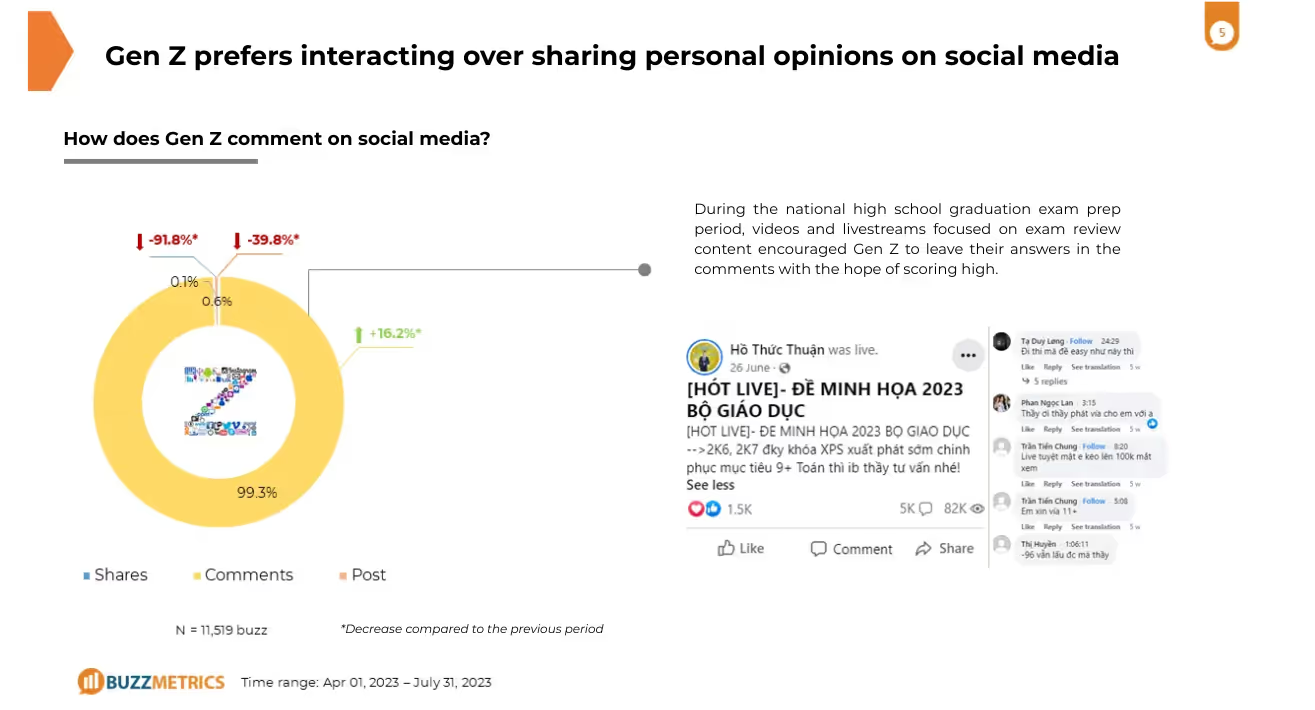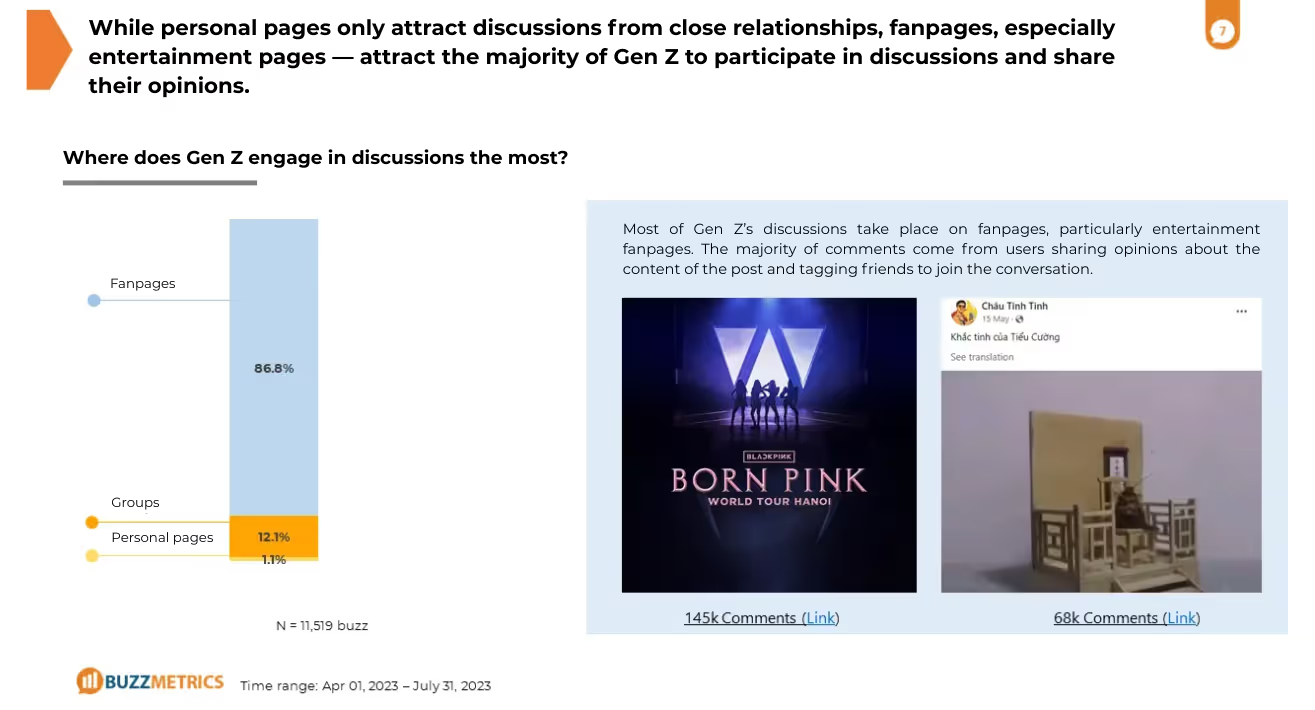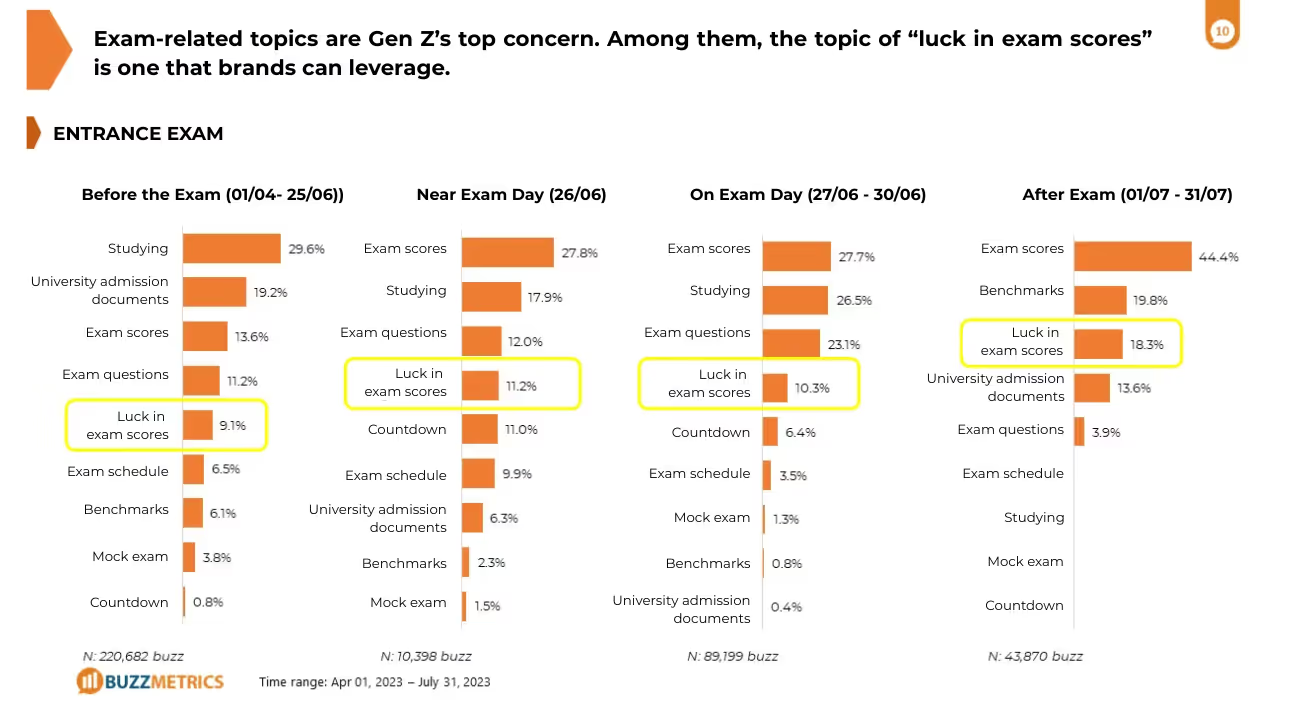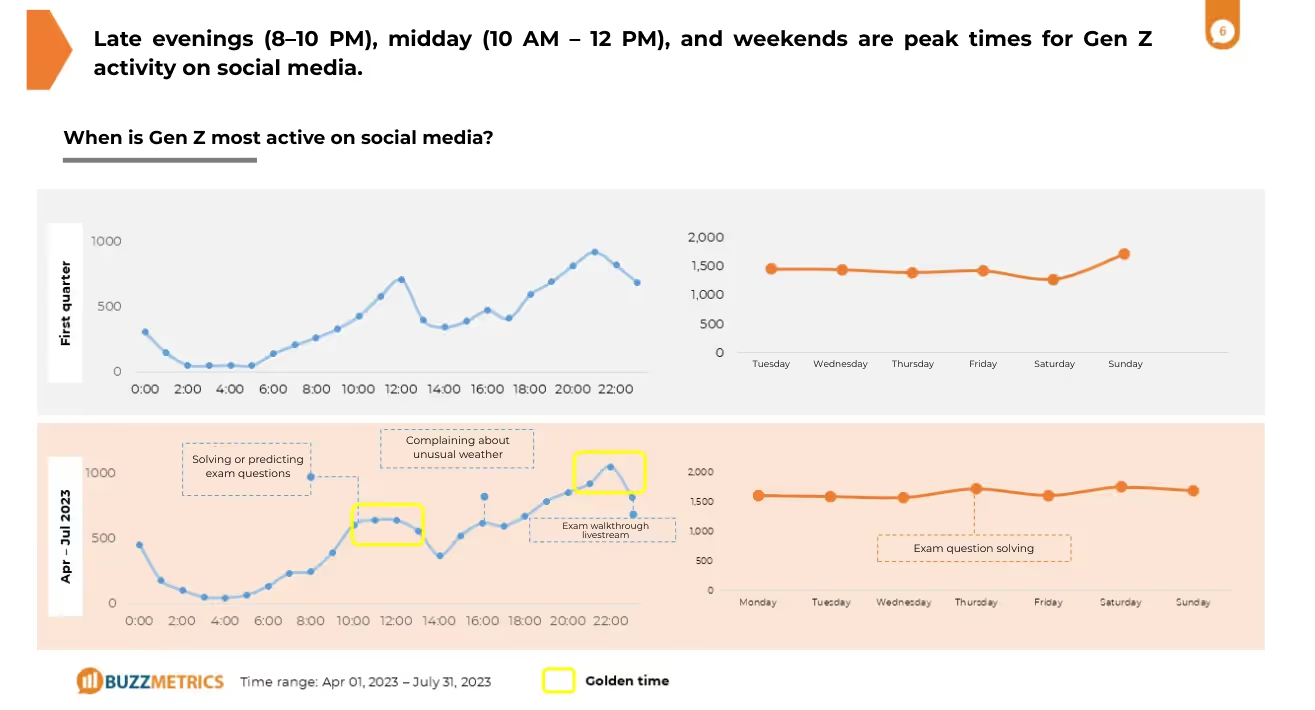Uncover 3 Key Insights about Gen Z [2024 Update]

For a long time, Millennials have been considered the main consumer force by brands due to their strong purchasing power and continuous growth over the years. However, this generation is now showing signs of being caught up by a completely new generation: Gen Z. According to Nielsen, by 2025 in Vietnam, Gen Z is expected to reach 15 million people and account for 30% of the consumer base.
Even now, brands tend to focus more on Millennials and there is still a lack of research on Gen Z. When it comes to Gen Z, brands often do not have a clear image, instead associating the generation with keywords like young, creative and active on social media. However, Gen Z’s actual behavior on social media differs from how brands currently perceive them. So, what is Gen Z really like? Let’s explore in the article below with Buzzmetrics.
What is Gen Z?
The age range for Gen Z is different in each country, but most agree that this generation includes those born between 1997 and 2012. Unlike the young people of Gen X and even Gen Y, Gen Z grew up with digital technology from an early age, becoming familiar with the Internet and social media and mastering smart devices even before they could read or write. As a result, this generation is also known by various other names: iGeneration, Generation, Homeland, Net Gen, Neo-Digital Natives, Digital Natives, Pluralist Generation, Internet Generation, Centennials, Later - Millennials, Gen Wii, Zoomers, Gen-Tech,…
Gen Z is the core customer group of the future
When mentioning Gen Z, we often think of a young group still in school and not yet financially independent, which leads to limited purchasing power and mainly influencing their parents' buying decisions rather than being the final decision-makers themselves. However, in reality, the oldest members of Gen Z are now between 24 and 27 years old. They are already working, financially capable and some have even started families of their own.
According to research by McKinsey, Gen Z currently accounts for 40% of global consumers. Additionally, Nielsen’s study titled “Generation Z - The consumers of the future” found that over 70% of surveyed Gen Z individuals reported having a significant influence on their family’s purchasing and lifestyle decisions. This includes decisions related to outdoor activities, entertainment, household items, clothing, food and beverages.
These figures highlight Gen Z as a highly promising consumer group with growing purchasing power. As a result, brands around the world are beginning to recognize that this generation is simply too important to ignore. A report by The Influencer Marketing Factory revealed that 97% of Gen Z admit that social media influences their shopping decisions. Additionally, a separate study by Statista found that 54% of Gen Z believe social media helps them discover new products more effectively than traditional online search methods.
Given these insights, it’s clear that to engage Gen Z effectively, brands must gain a deep understanding of their digital behavior, especially on social media platforms.
Decoding social media behavior of Gen Z
Fact #1: Gen Z prefers engaging with others’ content over sharing their own opinions online
The digital environment has become an essential part of Gen Z’s daily life. Because of their close connection with the virtual world, brands often view Gen Z as content creators on social media, who actively express opinions or share reviews online.

However, according to Buzzmetrics, Gen Z is more likely to engage with content more than create it. They prefer engaging with others' posts (by liking, commenting or sharing) rather than creating their own. If they do post something, it’s usually a selfie accompanied by a simple caption. Questions like “What does Gen Z care about?” or “What is their lifestyle like?” are difficult to answer just by looking at their personal pages. In contrast, older generations such as Gen X or even some Millennials are often more willing to create content, writing posts to express their opinions (about family, society, lifestyle, etc.) or to share everyday activities (like travel, leisure, shopping). Their interests and lifestyle choices are often clearly reflected on their social media profiles. This presents an interesting contrast, as older generations are often referred to as Digital Immigrants. They grew up before social media existed and are usually seen as less tech-savvy. Yet, the way they present themselves online tends to be more open than Gen Z. As a result, in order to truly understand and connect with Gen Z, brands must identify where this generation genuinely belongs in the digital space.
Key questions:
- What other differences does Gen Z have compared to previous generations?
- If Gen Z isn't visible on their personal profiles, where can brands find them?
Sign up to purchase the Gen Z report here.
Fact #2: Gen Z prefers sharing their opinions on community pages rather than on personal profiles
Gen Z is a young generation that has grown up immersed in technology and has helped expand the vocabulary of social media users. You’ll often come across comments that include quirky phrases like “dảk dảk” or “bủh bủh” - signature expressions of Gen Z’s online language. This gives the impression that any space on social media could be a buzzing discussion spot for them. However, research from Buzzmetrics shows a different side: this group tends not to share much about their personal lives through food photos or selfies with short captions. In other words, their personal profiles often appear relatively quiet, which challenges the common assumption that Gen Z is always present and vocal everywhere online. So where exactly does Gen Z really live on social media?

According to Buzzmetrics’ research on social media discussions, Gen Z tends to share and engage in public conversations less on their personal profiles and more on channels with a stronger community focus such as fanpage. Specifically:
- Fanpage is the main discussion platform of Gen Z: As much as 86.8% of Gen Z’s online discussions take place on fanpages, especially those related to entertainment. This indicates that fanpages are the primary platform attracting Gen Z’s participation, where they feel comfortable sharing opinions and engaging with content. In terms of discussion topics, most of their conversations on fanpage revolve around entertainment content. For example, the event "BLACKPINK Born Pink World Tour in Hanoi" highlighted the strong interest of Gen Z by generating up to 145,000 comments.
- 12.1% of Gen Z’s discussions take place in social media groups. Although not as popular as fanpage, groups remain an important space where Gen Z users with shared interests connect around specific topics.
- Only 1.1% of Gen Z’s discussions happen on personal pages. This shows that personal pages are not the main platforms where Gen Z shares or discusses issues with a wider community but rather are limited to close and personal relationships.
Fact #3: What are the top topics Gen Z cares about most?
Gen Z discusses differently on community pages compared to their personal pages. Compared to previous generations, Gen Z has often been portrayed by the media as a mysterious generation. This is not only because Gen Z is relatively new and less thoroughly studied, but also because their true interests can only be identified by tracking discussions in community channels. There are topics considered “exclusive” to Gen Z, most notably school and exams. Among these, content about “luck” in exams presents an opportunity for brands to explore more deeply.
In the context of exam-related stress and anxiety, the element of luck is often valued by Gen Z students, sometimes even serving as an important source of emotional encouragement. Brands can take advantage of this topic by creating spiritually themed content like “share a spoon to get high scores” to boost engagement.

Aside from school-related topics, love and football are also subjects that Gen Z pays special attention to.
- Sports, football: Content related to match predictions and real-time updates are the types that Gen Z engages with the most. This shows that they’re not only interested in the final outcome but also enjoy participating in the prediction process and closely following the match’s progress.
Read more: Euro 2024 through the lens of Social Listening
- Love is always an essential part of the content that Gen Z engages with. Most love-related content that appeals to Gen Z tends to be humorous or “troll-like,” often involving tips, advice or playful guides on how to find a boyfriend or girlfriend.
Key questions:
- Besides school, love, sports, and football, does Gen Z have any other special interests?
- If they share the same interest, how does Gen Z differ from previous generations?
Register to purchase the Gen Z report here.
→ See also: What is target audience research?
Fact #4: What is the most active time frame for Gen Z on social media?
Understanding the peak activity times of Gen Z on social media helps brands optimize post timing, run ads or organize online events to effectively reach this audience.
- Late night (8:00 PM – 10:00 PM): This is the time when Gen Z typically wraps up their daily activities, such as work or school, and spends time relaxing or engaging on social media. This time frame is ideal for entertainment content, chatting with friends, or catching up on the latest community updates.
- Midday (10:00 AM – 12:00 PM): During this time, Gen Z often takes a short break between their morning and afternoon activities. It’s when they might check social media, read the news or participate in quick online activities before returning to work or study.
- Weekend: The weekend is when Gen Z has more free time, unbound by daily schedules such as school or work. This allows them to spend more time browsing social media, engaging with content, participating in discussions, or keeping up with the latest trends.

Tips to help brands reach Gen Z more effectively on social media (2024 update)
To seize opportunities and boost sales from Gen Z, brands must clearly understand the behavior of this group on social media. By choosing the right timing, creating content and products that accurately reflect what Gen Z wants, marketing campaigns will achieve greater effectiveness, leading to sustainable business growth.
- Choose the Right "Golden Hours" to Boost Conversion Rates: To achieve the highest effectiveness, target the time frames when Gen Z is most active—such as late evening (8:00 PM – 10:00 PM), midday (10:00 AM – 12:00 PM), and weekends. These are the periods when Gen Z is more receptive to information, making them ideal for launching promotional campaigns, discounts, or product introductions to maximize traffic. For example, Fuji Spa Center often offers a 10% discount from 10 AM to 12 PM, targeting office workers who stop by the spa to relax during their lunch break.
Leverage the right relevant topics: Understanding and leveraging the topics that Gen Z cares about most will help brands create viral content and enhance their reach on social media. When it comes to entertainment content, the content strategy of Gimbap 178 Minh Cầu is a notable example. While the entire F&B industry focuses on posting food photos, Gimbap 178 Minh Cầu skips that trend entirely and instead emphasizes meme content - short, humorous posts with little commercial intent. Their posts still revolve around food but are presented from quirky, humorous angles that attract Gen Z. The brand also posts consistently at 5 PM. This regular posting of memes helped build a habit among Gen Z of "checking in" on social media at that time, thereby boosting interaction frequency with the brand.
Contact the Buzzmetrics team to get the latest report with key Gen Z insights to guide your brand’s communication strategy.
Article Information












_11zon.avif)





